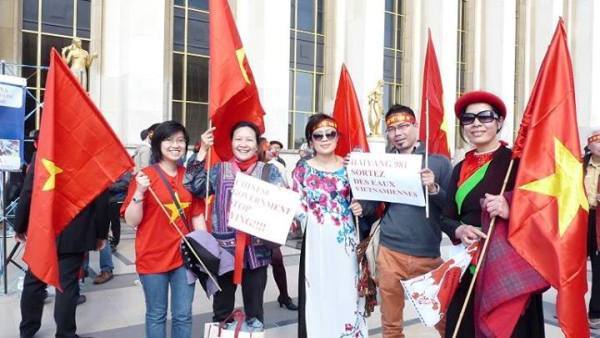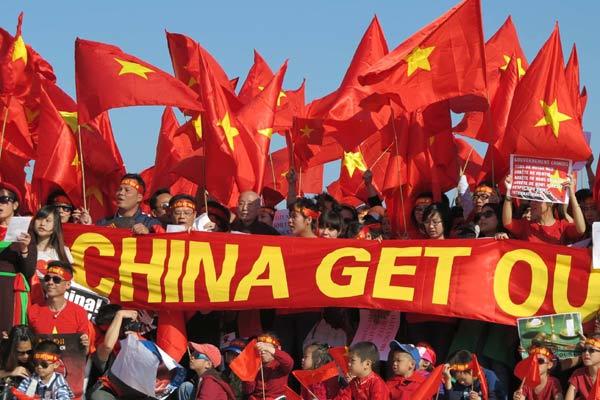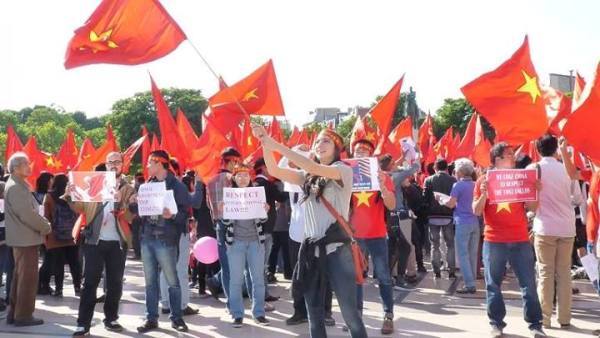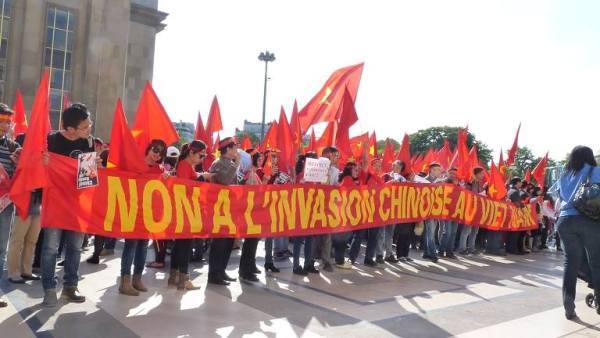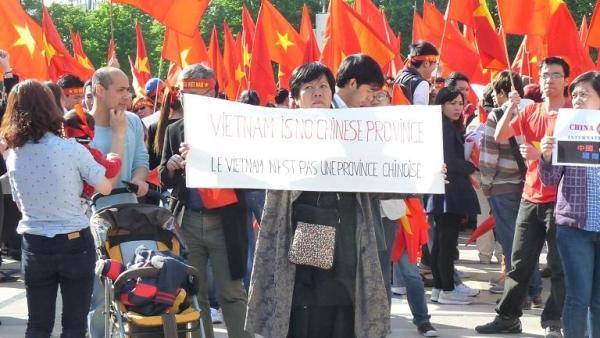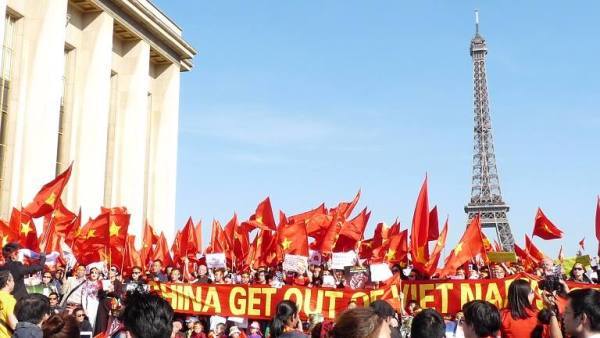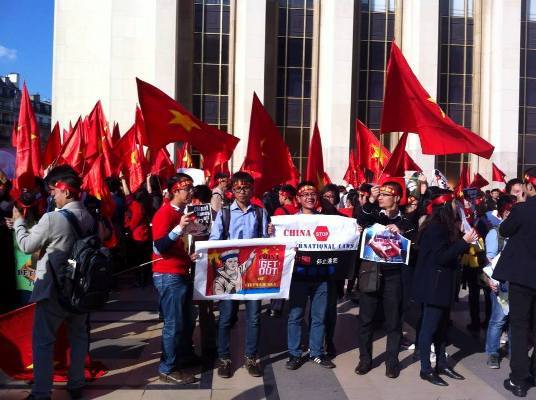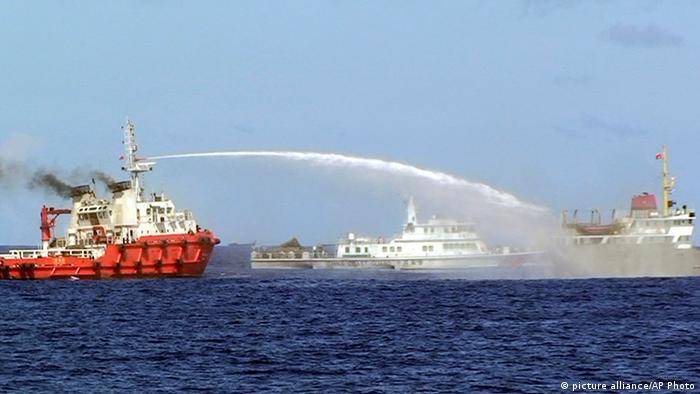Source: VNA May 28, 2014
 |
| A Chinese Coast Guard vessel chases and threatens a ship of Vietnamese fishermen. — Photo VNA |
HA NOI (VNS) — China's oil rig Haiyang Shiyou-981 was moved to a new site yesterday, but it was still completely within Viet Nam's continental shelf, the Ministry of Foreign Affairs said yesterday.
The Vietnamese Consulate Department under the Ministry of Foreign Affairs yesterday summoned representatives from the Chinese Embassy in Ha Noi and handed them a diplomatic note protesting against all of China's recent actions.
Foreign Ministry spokesman Le Hai Binh also issued a statement saying that the new position of the rig still violated Viet Nam's sovereign rights and jurisdiction.
Binh was responding to an announcement on Monday by the China Maritime Safety Administration that the rig had been moved from 15 degrees 29 minutes 58 seconds north latitude and 111 degrees 12 minutes 06 seconds east longitude to 15 degrees 33 minutes 38 seconds north latitude and 111 degrees 34 minutes 62 seconds east longitude.
"Viet Nam resolutely opposes the action and requests China to immediately stop the rig's operation, withdraw it and escort service ships from Viet Nam's waters, and not repeat such acts," he said.
"Viet Nam has full legal foundations and historical evidence to assert its undeniable sovereignty over Hoang Sa (Paracel) archipelago."
Binh said China used force to occupy the Hoang Sa archipelago and its action violated international law.
He added that occupation by force could not establish China's sovereignty over the archipelago.
At 5:30am yesterday, the rig was moved four nautical miles east-northeast at a speed of 4.5 nautical miles per hour.
This was revealed by the deputy head of the Vietnam Fisheries Resources Surveillance Department, Ha Le, at a press conference in Ha Noi.
At 10am, the rig was anchored at a new site, 25 nautical miles east-southeast of Tri Ton Island in Viet Nam's Hoang Sa (Paracel) archipelago, 23 nautical miles east-northeast of its previous location.
Vietnamese observation vessels have maintained their presence about six nautical miles from the rig.
Le quoted the fisheries surveillance force as saying that during the move, China kept the same number of ships, but they operated at a higher intensity.
Planes in action
Two Chinese planes constantly swept over the rig as it was moving.
China also deployed larger and higher capacity vessels operated by military and marine surveillance units.
The Chinese ships continued to ram and fire water cannons at Vietnamese vessels, pushing them far away from the illegal rig.
China's marine police patrol vessels, tugs and transport were divided into groups to get closer to Vietnamese law-enforcement ships, shoving them 10 nautical miles from the rig.
Chinese "fishing ships" hindered and threatened Vietnamese fishing boats operating 15 nautical miles from the rig. They also made a dangerous push against the Vietnamese boats.
China's warships also heightened their activities,even pointing naval guns at Viet Nam's fisheries surveillance vessels.
Harassing fishermen
Viet Nam has demanded Chinese vessels stop aggressive action against Vietnamese fishermen.
The Foreign Ministry said the Chinese had been chasing and threatening them with violence completely within Viet Nam's sea area.
"Once again, Viet Nam demands China stop its inhumane actions, endangering lives and damaging the property and legitimate interests of Vietnamese fishermen," said ministry spokesman Binh.
He asked the Chinese to respect international law, punish those responsible in earnest, pay adequate compensation and prevent a repeat of the behaviour.
Vietnamese agencies familiar with the situation have reported that since early May, many Vietnamese fishing boats have repeatedly been disrupted from their work and driven off by Chinese ships.
Chinese forces have also beaten and injured Vietnamese fishermen, threatening their lives.
Binh said the China's actions violated Viet Nam's sovereignty, sovereign rights and jurisdiction in the East Sea.
He said it also ran counter to the spirit of the Declaration on the Conduct of Parties in the East Sea (DOC).
At the beginning of May, China illegally placed the rig Haiyang Shiyou – 981 rig, as well as a large fleet of armed vessels, military ships and aircraft, at 15 degrees 29 minutes 58 seconds north latitude and 111 degrees 12 minutes 06 seconds east longitude. The location was 80 nautical miles inside Viet Nam's continental shelf and exclusive economic zone.
Chinese ships have repeatedly rammed and fired water cannons into Vietnamese coast guard and fisheries surveillance ships performing law enforcement missions in Viet Nam's waters, leaving many Vietnamese boats damaged and officers injured.
World takes notice
International news agencies and media yesterday posted articles highlighting the sinking of a Vietnamese fishing boat by Chinese vessels.
France's AFP news agency reported that the attack occurred after the Vietnamese boat was encircled by 40 Chinese vessels.
The boat was sunk about 17 nautical miles southwest from where the oil rig was placed. Ten fishermen on board were rescued by other Vietnamese vessels.
The news agency also quoted Japanese Government spokesperson Yoshihide Suga as describing China's act as "extremely dangerous".
Meanwhile, Britain's BBC radio highlighted a statement by the Vice Chairman of Viet Nam's National Assembly, Huynh Ngoc Son.
He described China's ramming of boats as "terrorist attacks" aiming to intimidate Vietnamese fishermen.
The BBC reported that Viet Nam was preparing to take China to an international tribunal over the placement of the rig and the many ramming incidents.
The radio Voice of Russia and other major global news outlets, such as the US's Bloomberg, Australia's ABC and the Britain's Guardian, all highlighted the event.
Further condemnation
The Viet Nam Union of Friendship Organisations (VUFO) and the Viet Nam Youth Union (VYU) have called on organisations, individuals, political circles and peace-loving people throughout the world to continue requesting China to immediately withdraw its oil rig and surrounding ships from Viet Nam's waters.
In a letter released yesterday, VUFO expressed its concern about China's placement of the oil rig and a large number of ships and planes on Viet Nam's continental shelf.
It said that China's unilateral deed seriously violated Viet Nam's sovereign rights over an exclusive economic zone and continental shelf and ignored the Declaration on the Conduct of Parties in the East Sea (DOC) between China and ASEAN nations.
VUFO also accused China of infringing the 1982 United Nations Convention on the Law of the Sea (UNCLOS), saying that its move threatened peace, stability and security in the region and the world, as well as negatively affects the friendship and cooperation between the two countries.
It expressed deep gratitude to the international community for their support and requested the Chinese side to respect international law and Viet Nam's sovereignty.
On Monday, the Viet Nam Youth Union also issued a statement protesting against China's acts.
The youth union requested China to remove its rig, strictly abide by international law, especially the UNCLOS, and not proceed with similar actions in future.
It called on youth organisations at home and abroad to support Viet Nam's agencies and fishermen and safeguard the country's sovereignty and legitimate interests in the East Sea.
Manila warning
President of the Philippines, Benigno Aquino, has warned that China's illegal placement of the rig showed that Beijing might seek to repeat the act in other waters in the East Sea, thus worsening instabilities in the region.
In an interview with Britain's Financial Times, Aquino said China was playing a dangerous game that could spiral out of control, hurting diplomatic ties and potentially escalating into clashes.
He added that what happened to Viet Nam might also happen to the Philippines. He urged China to stop unilateral actions that contravened the Declaration of the Conduct of Parties in the East Sea (DOC) it signed together with ASEAN in 2002.
He said ASEAN members should present a stronger and clearer voice about how to resolve such disputes in line with international law.
Meanwhile, world commentators reiterated that Beijing's unilateral action damaged China's prestige in the international arena.
Hong Kong's South China Morning Post recently ran an article titled Beijing's dangerous arrogance in the South China Sea by veteran commentator Philip Bowring.
Bowring said China's behaviour towards its East Sea neighbours was aggressive and arrogant.
Sharing the same view, columnist Brad Glosserman said in the American publication The National Interest that China's prestige had suffered as it was now seen as the orchestrator of regional instability. - VNS



